Recent Articles
Popular Makes
Body Types
2017 Mercedes-Benz Metris Road Test and Review

2016 Mercedes-Benz Metris Passenger ・ Photo by Mercedes-Benz
Just so everyone’s on the same page here, yes, the 2017 Mercedes-Benz Metris is a commercial van. While the brand’s U.S reputation is based primarily on its premium cars and SUVs, Mercedes actually has a thriving international presence with its commercial truck lineup. In the United States, the brand also has found enough success with the Sprinter full-size commercial van that it’s now building a manufacturing plant for the vehicle in South Carolina. The Metris, which was introduced in this country in 2015, is more of a midsized entry, but that’s exactly its chief benefit: It’s bigger than the typical next-gen city-sized van, yet it’s a noticeably more nimble alternative to the larger footprint that comes with a full-sizer. Along with its Mercedes pedigree, Metris models also serve up standard rear-wheel drive, robust towing capabilities, versatile configurations, and both passenger and cargo configurations — and more.
Pricing
With the introduction last year of lower-cost “WORKER” models, the 2017 Mercedes-Benz Metris lineup furnishes surprisingly strong values right out of the gate. The WORKER cargo van continues to offer what the brand calls the “most attractive price of any U.S. Mercedes-Benz” and starts at $25,955. Indeed, the least expensive Mercedes-Benz retail vehicle, the CLA Coupe, stickers from $32,400. As for the more likely Metris rivals, the Ford Transit Connect does happen to be a bit less expensive than the Mercedes vehicle, with an MSRP of $23,010, but it’s also noticeably smaller and less capable; the larger Ford Transit then has a much larger entry price of $31,610. It’s the same with the Chevy, Nissan, and Ram rivals, too. That is, the Metris falls between those brands’ city-sized vans and their full-sized entries, but with pricing closer to that of the smaller vehicles. The Metris WORKER passenger van has an MSRP of $29,995.
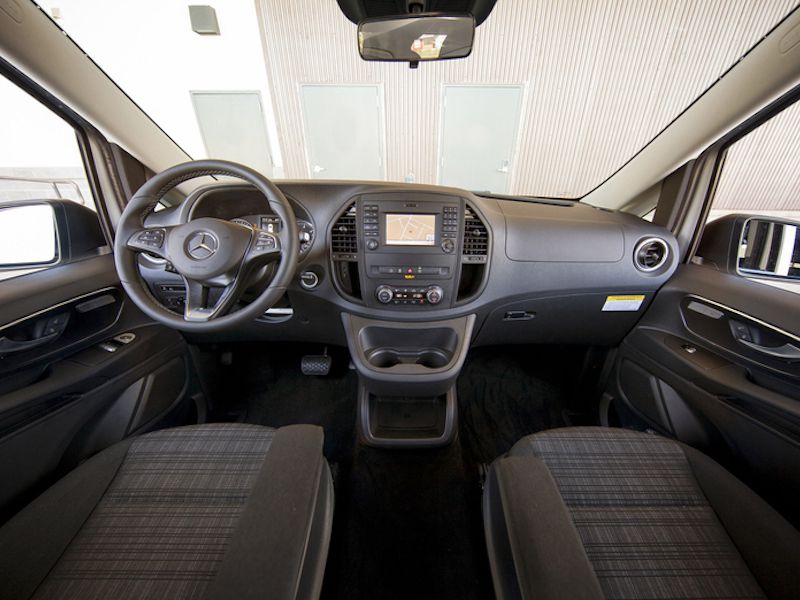
Photo by Mercedes-Benz
Power, Performance, and Fuel Efficiency
The right powertrain is especially important for commercial customers, and the one for the 2017 Mercedes-Benz Metris was engineered specifically for the needs of North American drivers. The engine itself is a four-cylinder, 2.0-liter turbo, which M-B engineers have paired to a seven-speed automatic transmission. Output is rated at 208 hp and 258 lb-ft of torque — enough for a maximum towing limit of 5,000 lbs — yet the Metris also is impressively efficient. Per the EPA, cargo vans can achieve fuel-economy grades of 20 mpg city/23 mpg highway/22 mpg combined, with passenger vans providing an EPA line of 21/24/20. Now, it’s true that the Metris therefore trails its smaller rivals in terms of highway fuel economy. Owners operating in the city, however, should know that the more powerful Metris can be more efficient than the competition in an urban setting.

Photo by Mercedes-Benz
Exterior design
Although certainly not as attractive as members of the brand’s retail roster, the 2017 Mercedes-Benz Metris does manage to project the kind of rugged, work-ready image that’s missing from so many of those smaller, somewhat cartoonish city vans. The black lower cladding below the grille and rear bumper also add to the vehicle’s aura of practicality. And needless to say, having that Mercedes tri-star badge smack-dab in the center of that grille has an impact on the van’s presence. The Metris further features numerous functionality benefits for its exterior. For instance, depending on the exact van configuration chosen, owners can select between 180-degree-opening rear doors, 270-degree doors, or a rear liftgate. A passenger-side slide door is standard as well, with owners able to order a sliding door for the driver’s side and power-sliding doors if preferred. Heated mirrors, 20-spoke alloy wheels, and premium metallic paint colors help fill out the Metris options menu.

Photo by Mercedes-Benz
Passenger van interior
The midsize dimensions of this vehicle — already mentioned in our 2017 Mercedes-Benz Metris Road Test and Review — also ensure more interior space than in the city-sized vans. In its passenger configuration, for example, the Metris has standard seating for seven in a two-two-three layout that still leaves room for an expansive 38 cubic feet of cargo space. Moreover, an available third seat for the second row allows seating for eight without impacting the rear cargo hold. The interior of the Metris passenger van additionally comes standard with a dedicated rear-seat air-conditioning system, multiple rear-seat 12-volt outlets, and four rear audio speakers. On the topic of audio, the standard setup for WORKER models includes Bluetooth, a display screen, and AM/FM/USB/AUX playback capability; in “regular” Metris models, that screen is a 5.8-inch color display that can be upgraded for use with an available rearview camera system and Becker MAP PILOT navigation system.
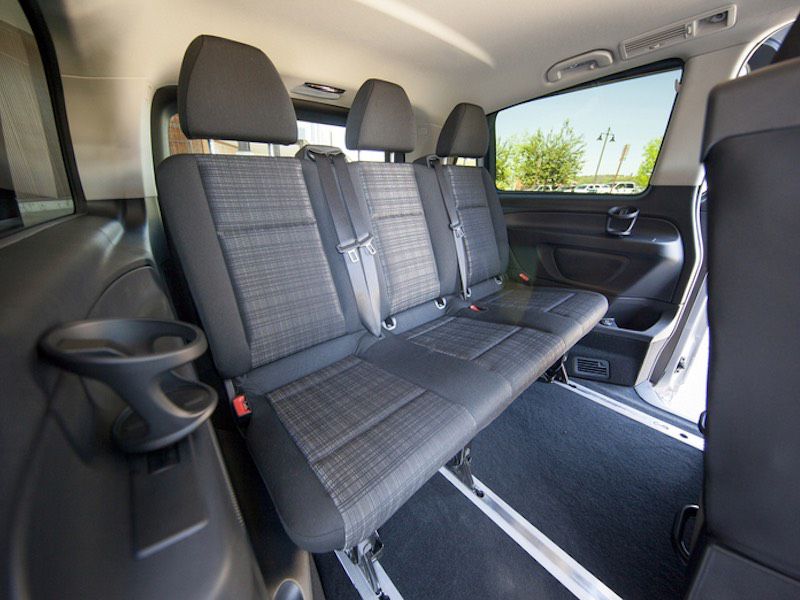
Photo by Mercedes-Benz
Cargo van interior
Of course, the interior of the 2017 Mercedes-Benz Metris cargo van does offer many of the same front-row amenities as the passenger vans, including the navigation and upgraded audio system. But behind the driver and front-seat passenger, Mercedes swaps out the rear seats for a standard wooden load floor and enough room to hold 60 sheets of 4’ x 8’ drywall. All told, this version of the Metris can make room for 186 cubic feet of storage. The smaller Ford, Chevy and Nissan vans? They’re limited to maximum cargo capacities below 125 cubic feet. To enhance Metris' functionality, owners also can order a variety of cargo-management features, rear LED lighting, waist-level composite panelling, and a partition for through-loading. Just don’t forget that, even with its interior advantages, the Metris turning circle of 36.4 feet is tighter than the Chevy or Nissan — and a mere 3.6 inches wider than the Ford’s.
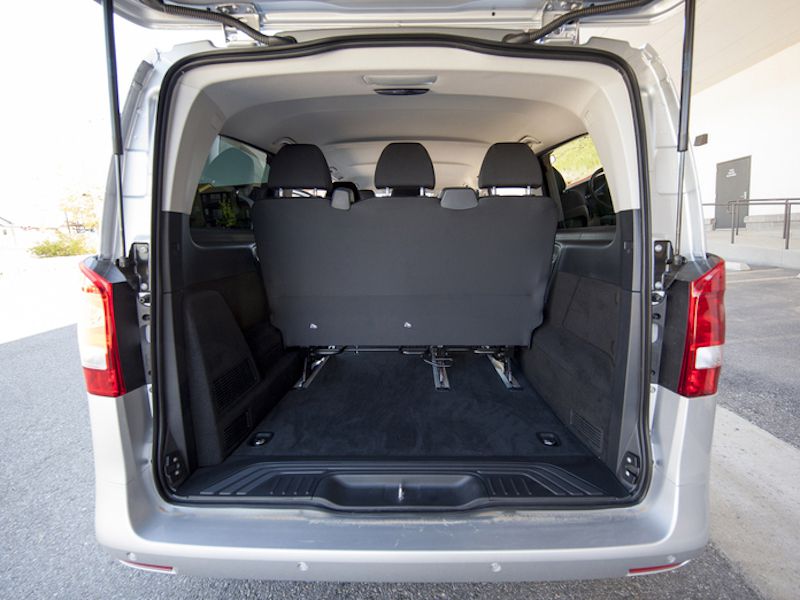
Photo by Mercedes-Benz
Standard technology
The 2017 Mercedes-Benz Metris may be meant for commercial customers, but they can deliver a fair amount of comfort in meeting their needs. Thus, all models, even the high-value WORKER editions, are equipped with Bluetooth plus a display audio system that has five front speakers and USB/auxiliary inputs. Passenger vans welcome rear audio speakers and multiple rear-seat 12-volt outlets. Where the automaker’s engineering expertise really shines, though, is in the broad range of safety and driver-assistance technologies in the Metris. Right off the bat, a comprehensive array of airbags is standard, including window-curtain airbags in passenger-van models to protect all occupants. Also standard are advanced tech features you won’t find on some luxury cars, like Mercedes’ ATTENTION ASSIST drowsy-driver alert, an electronic stability system that adjusts to the van’s load, and Crosswind Assist. This last resource automatically provides steering inputs to keep drivers on track in high winds.
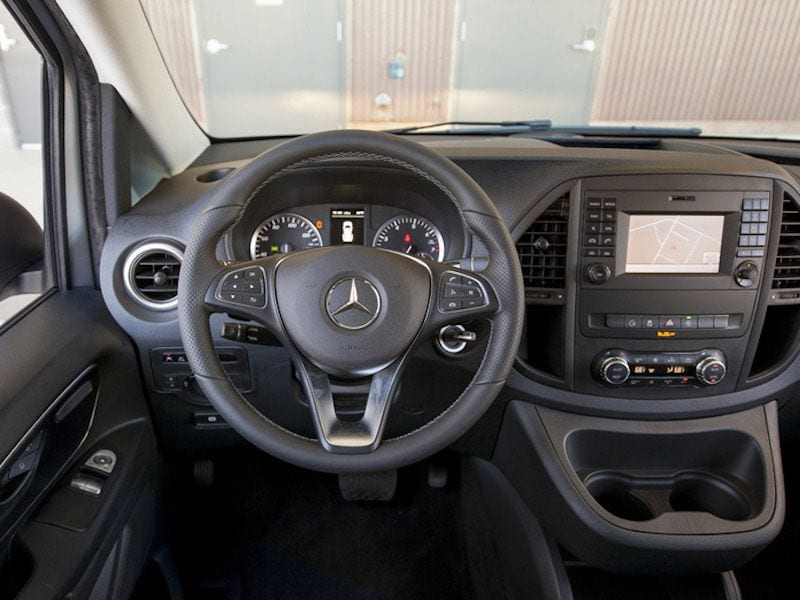
Photo by Mercedes-Benz
Available technology
As discussed above, the 2017 Mercedes-Benz Metris counts a rearview-camera system among its tech options, but what wasn’t covered was that the system has guideline overlays to make reversing yet easier. Other sophisticated technologies on the options menu for the Metris are a trio of technologies that should be familiar to most retail customers. First, there’s a camera-based lane-keeping assistance with visual and audible alerts; complementing that are two radar-based technologies, both a blind-spot assistance setup, with in-mirror warning lights, and the automaker’s Collision Prevention Assist. Particularly beneficial when maneuvering in traffic, Collision Prevention Assist activates visual and audible alerts when getting too close to a vehicle ahead, and it can engage automatic brake-pressure boosting in certain scenarios. Meanwhile, the Mercedes’ PARKTRONIC system with Active Parking Assist bolsters the van’s in-city delivery credentials: Yes, the Metris can park itself, eliminating a major potential hassle for drivers.

Photo by Mercedes-Benz
Other cool info for commercial customers
Mercedes-Benz commercial vehicles are renowned for their low ownership costs, and the 2017 Mercedes-Benz Metris carries on that tradition. Service intervals can be up to 15,000 miles, which means less downtime and more productivity. The Metris also can build on its relative robust fuel-efficiency performance with an available “ECO Start/Stop” system. By automatically turning off the engine when the van is stopped, you stop spending money on fuel at the same time. More money saving is possible with the many popular option packages for the Metris, since these pull together key content elements at discount pricing. Nor is there any shortage of upfitter options for the Metris. Leveraging the Mercedes Master Solutions program, owners can optimize the Metris for refrigeration applications, HVAC and plumbing, electrical and telecommunications professionals, delivery and general services, and a number of different people-hauling roles.

Photo by Mercedes-Benz
Final thoughts
The short story here: The 2017 Mercedes-Benz Metris is the Mercedes of small-ish commercial vans, showcasing clear advantages in cargo volume, passenger volume, towing, payload, and technology versus the compact vans such as the Ford Transit Connect, Chevrolet City Express, Nissan NV200, or RAM ProMaster City. On the road, remember, the Metris also can be almost as maneuverable, with a turning circle smaller than some of its city-van rivals — and better urban fuel-efficiency ratings. Now, the Metris is not without its flaws. For one, despite its focus on keeping ownership costs low, it does require premium fuel. Similarly, there is a flipside to its cavernous interior, since the midsize Mercedes is indeed two feet longer than those rivals. If the smallest possible footprint at the lowest possible MSRP is your goal, the Mercedes van isn’t going to be a good fit. But for anyone else, at least checking out the Metris before buying a commercial van is a great idea.
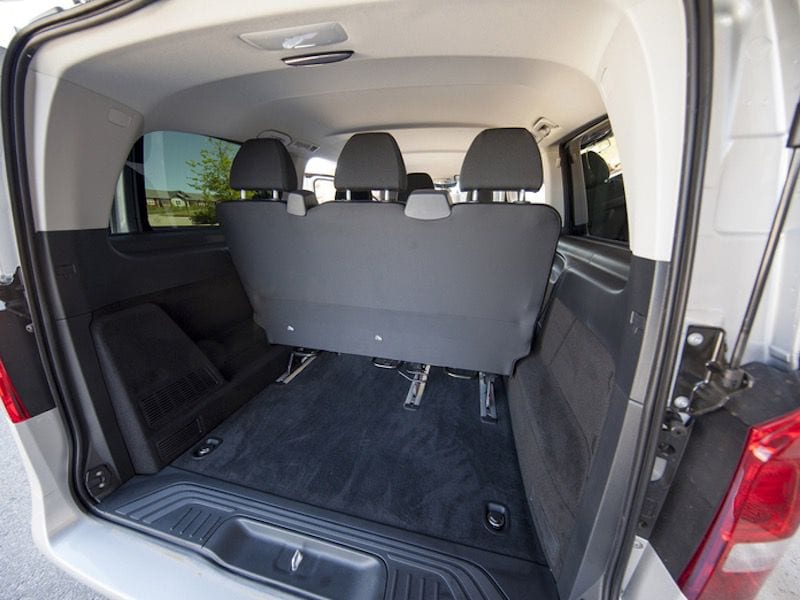
Photo by Mercedes-Benz